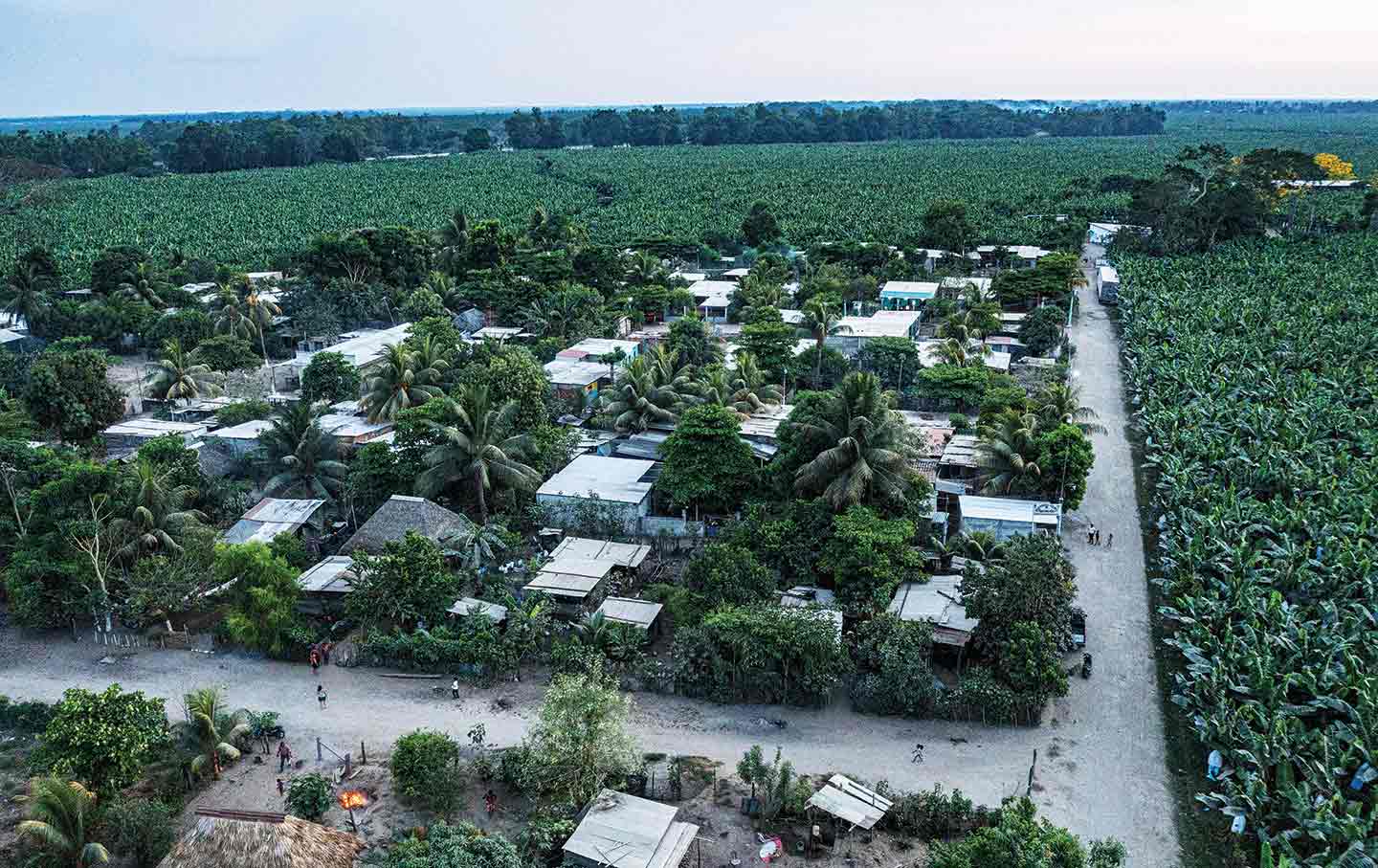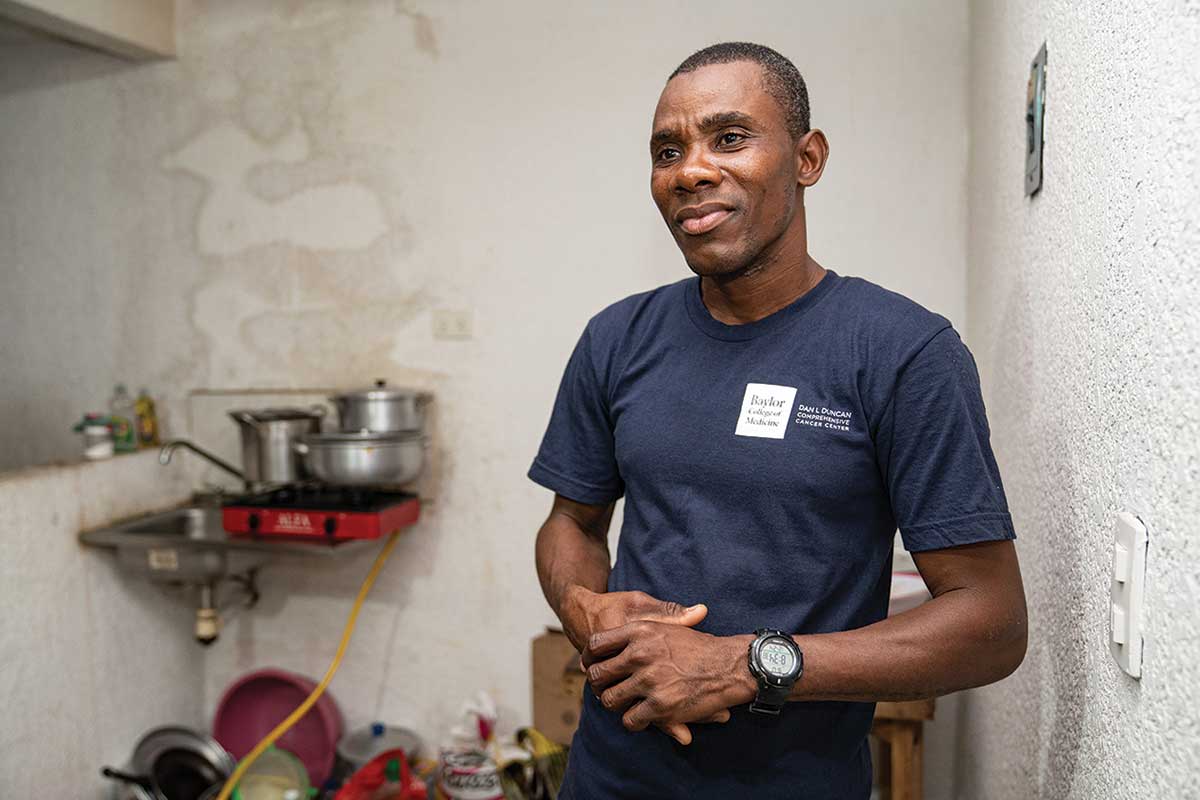Welcome to DU!
The truly grassroots left-of-center political community where regular people, not algorithms, drive the discussions and set the standards.
Join the community:
Create a free account
Support DU (and get rid of ads!):
Become a Star Member
Latest Breaking News
General Discussion
The DU Lounge
All Forums
Issue Forums
Culture Forums
Alliance Forums
Region Forums
Support Forums
Help & Search
Latin America
Related: About this forumHow US Policy Has Trapped Migrant Workers in an "Open-Air Prison" in Mexico

Bitter harvest: The modest homes of farm workers in Tapachula, with banana fields stretching far into the distance. (Lexie Harrison-Cripps)
APRIL 3/10, 2023, ISSUE
Thanks to US border restrictions, thousands of migrants are stuck indefinitely in Chiapas, harvesting the fruits that Americans can’t get enough of.
By Esther Honig
TODAY 5:00 AM
I first met Jones Carme on an evening in March 2022. He was in front of his apartment on the outskirts of Tapachula, Mexico, a tropical city of some 350,000 people in Chiapas, just 20 minutes from the border with Guatemala. Tapachula was founded by the Aztecs in the 15th century, and just as it was then, the region today is an agricultural hub and a major producer of crops like corn, coffee, mangoes, and bananas. I’d come to this neighborhood to talk to migrants working in local agriculture, and this cluster of worn stucco apartments was a short walk from a massive mango plantation and packing house.
Carme, who had just arrived home after working a 12-hour shift in the mango fields, was rail thin with high cheekbones. He knew little Spanish, and I spoke no Haitian Creole, his native language. But he spoke a bit of English, and our conversation stumbled along. Despite being physically exhausted, Carme, who’s 42, was eager to talk. In the warm evening air, we stood in his doorway as he told me that, unlike many other Haitian migrants who hoped to continue north to the United States, he wanted to rebuild his life in Mexico.
“I will go to another city—for example, Mexico City—to find a good job to help my family,” he said.
Originally from Haiti, Carme has been on the move for the past five years, searching for a place to settle. In Port-au-Prince, where he was a French teacher and grew and sold peppers, his life had become untenable as the country devolved into chaos following the huge earthquake in 2010 that killed hundreds of thousands of people and left many more homeless. Violent gangs steadily gained control of the capital, and in 2021 Haiti’s president was assassinated. Carme said a group of gang members had come to his home to extort money, and he was worried they would return and kill him. So like many other men in his situation, Carme fled to South America, leaving his wife behind, before eventually making his way, in the summer of 2021, to Mexico’s southern border.
That is where he got stuck.

From Haiti to Mexico: Jones Carme in his kitchen in Tapachula. (Lexie Harrison-Cripps)
Had Carme arrived in Tapachula a couple of years earlier, the city would likely have been a brief and unremarkable stop on his journey. Unfortunately for him and many thousands of other migrants, in 2019 President Donald Trump threatened to levy a 5 percent tariff on all Mexican goods unless the country agreed to beef up its immigration enforcement. Mexico acquiesced and deployed troops along its southern border with Guatemala, limiting the free movement of migrants. The government ceased issuing routine exit visas in 2019 that had allowed migrants to reach the US border; migrants must now wait in the state where they’ve filed their immigration claim before they can continue on. As a result, countless people have been caught in a bureaucratic bottleneck, as Mexico’s immigration system struggles to process a surge in cases. It can take from three to six months for the documents to arrive, and it sometimes takes years. The Biden administration, which has overturned some of Trump’s more extreme immigration initiatives, has remained committed to this particular strategy, offering Mexico 2.5 million doses of the Covid vaccine and development money in exchange for its continued cooperation on immigration enforcement. No longer the primary source of immigrants to the US, Mexico has become part of America’s de facto border infrastructure.
More:
https://www.thenation.com/article/world/migrant-workers-mexico-tapachula/
InfoView thread info, including edit history
TrashPut this thread in your Trash Can (My DU » Trash Can)
BookmarkAdd this thread to your Bookmarks (My DU » Bookmarks)
1 replies, 578 views
ShareGet links to this post and/or share on social media
AlertAlert this post for a rule violation
PowersThere are no powers you can use on this post
EditCannot edit other people's posts
ReplyReply to this post
EditCannot edit other people's posts
Rec (1)
ReplyReply to this post
1 replies
 = new reply since forum marked as read
Highlight:
NoneDon't highlight anything
5 newestHighlight 5 most recent replies
= new reply since forum marked as read
Highlight:
NoneDon't highlight anything
5 newestHighlight 5 most recent replies
How US Policy Has Trapped Migrant Workers in an "Open-Air Prison" in Mexico (Original Post)
Judi Lynn
Mar 2023
OP
rampartc
(5,407 posts)1. thy don't they just walk across biden's "open border?"